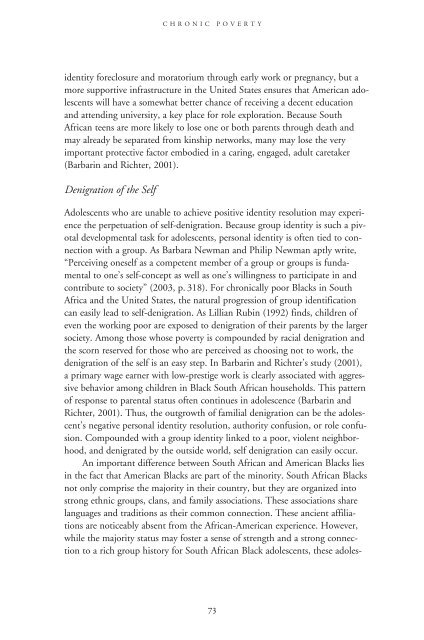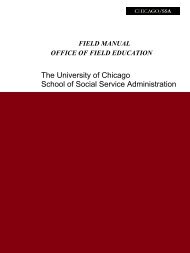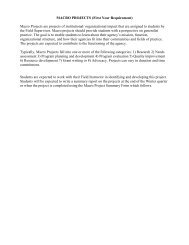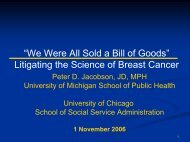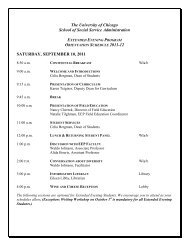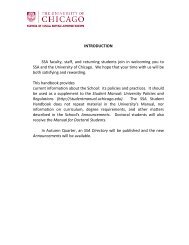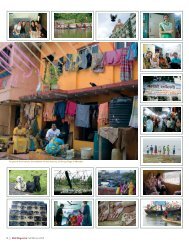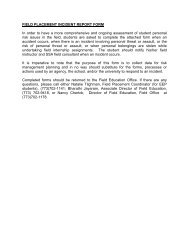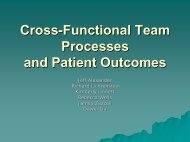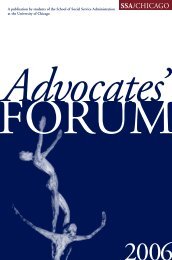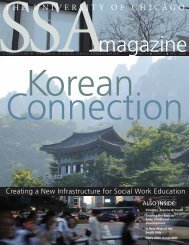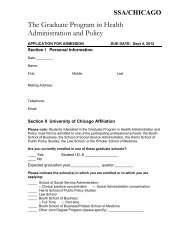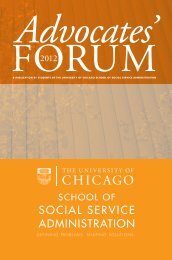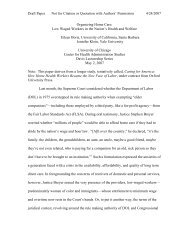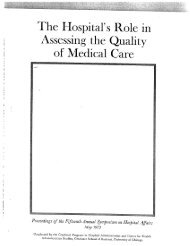2004 - School of Social Service Administration - University of Chicago
2004 - School of Social Service Administration - University of Chicago
2004 - School of Social Service Administration - University of Chicago
You also want an ePaper? Increase the reach of your titles
YUMPU automatically turns print PDFs into web optimized ePapers that Google loves.
CHRONIC POVERTY<br />
identity foreclosure and moratorium through early work or pregnancy, but a<br />
more supportive infrastructure in the United States ensures that American adolescents<br />
will have a somewhat better chance <strong>of</strong> receiving a decent education<br />
and attending university, a key place for role exploration. Because South<br />
African teens are more likely to lose one or both parents through death and<br />
may already be separated from kinship networks, many may lose the very<br />
important protective factor embodied in a caring, engaged, adult caretaker<br />
(Barbarin and Richter, 2001).<br />
Denigration <strong>of</strong> the Self<br />
Adolescents who are unable to achieve positive identity resolution may experience<br />
the perpetuation <strong>of</strong> self-denigration. Because group identity is such a pivotal<br />
developmental task for adolescents, personal identity is <strong>of</strong>ten tied to connection<br />
with a group. As Barbara Newman and Philip Newman aptly write,<br />
“Perceiving oneself as a competent member <strong>of</strong> a group or groups is fundamental<br />
to one’s self-concept as well as one’s willingness to participate in and<br />
contribute to society” (2003, p. 318). For chronically poor Blacks in South<br />
Africa and the United States, the natural progression <strong>of</strong> group identification<br />
can easily lead to self-denigration. As Lillian Rubin (1992) finds, children <strong>of</strong><br />
even the working poor are exposed to denigration <strong>of</strong> their parents by the larger<br />
society. Among those whose poverty is compounded by racial denigration and<br />
the scorn reserved for those who are perceived as choosing not to work, the<br />
denigration <strong>of</strong> the self is an easy step. In Barbarin and Richter’s study (2001),<br />
a primary wage earner with low-prestige work is clearly associated with aggressive<br />
behavior among children in Black South African households. This pattern<br />
<strong>of</strong> response to parental status <strong>of</strong>ten continues in adolescence (Barbarin and<br />
Richter, 2001). Thus, the outgrowth <strong>of</strong> familial denigration can be the adolescent’s<br />
negative personal identity resolution, authority confusion, or role confusion.<br />
Compounded with a group identity linked to a poor, violent neighborhood,<br />
and denigrated by the outside world, self denigration can easily occur.<br />
An important difference between South African and American Blacks lies<br />
in the fact that American Blacks are part <strong>of</strong> the minority. South African Blacks<br />
not only comprise the majority in their country, but they are organized into<br />
strong ethnic groups, clans, and family associations. These associations share<br />
languages and traditions as their common connection. These ancient affiliations<br />
are noticeably absent from the African-American experience. However,<br />
while the majority status may foster a sense <strong>of</strong> strength and a strong connection<br />
to a rich group history for South African Black adolescents, these adoles-<br />
73


